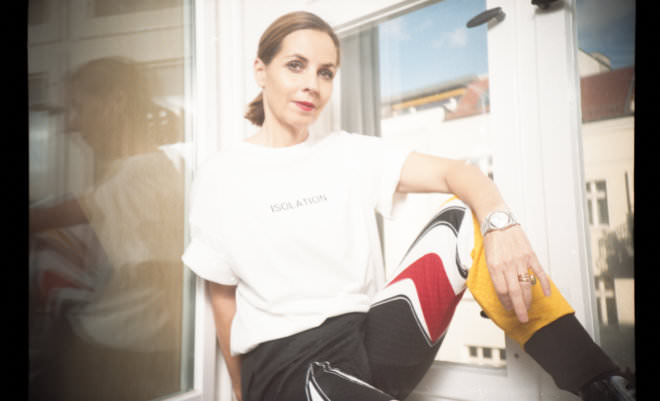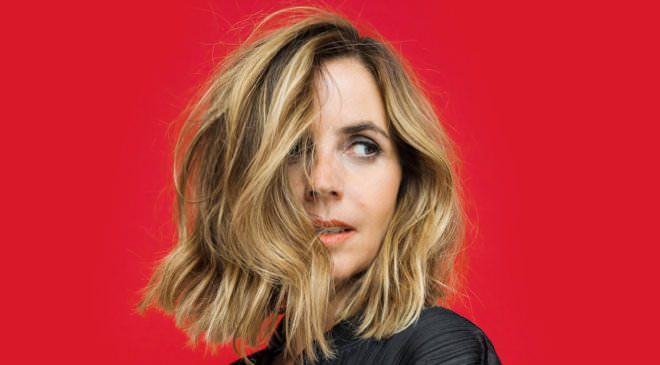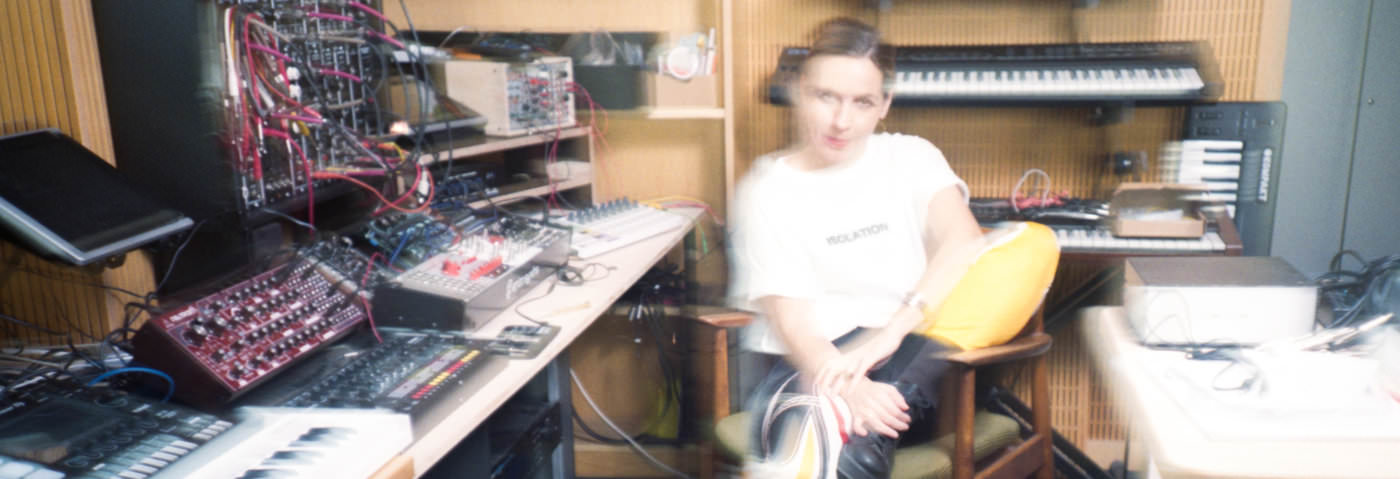‘In the’80s, Berlin was a little island for freaks, even David Bowie and Depeche Mode knew this’. Anja Schneider talks about her beginnings, reading a crowd and why a DJ is a DJ after all.

Anja Schneider (DJ, producer, radio broadcaster, label owner) is a creative force who tirelessly continues to create, reinvent and reinvigorate. An influencer and mentor to many, she is responsible for developing and nurturing a roster of artists including Pan-Pot, Sebo K, Rodriguez Jr., Kevin Over and more. Besides being one of the hardest working figures within the industry, she also happens to be a pretty amazing human to boot.
As my photographer and I were lost on our way to interview Anja, we walked through a door and into a ball of beaming sunlight that felt angelic and surreal. Anja walks out of her office and guided us on a tour through gear heaven in her two music studios, just how every interview should start for music tech nerds. What began with questions on a piece of paper were later tossed aside as we enjoyed a casual conversation with one of the most influential DJs in Europe.
We talk about some goosebump moments throughout her years in music, the first clubs that really changed her life, her move to Berlin, Nitzer Ebb, how kids interpret Techno these days, how she discovers and selects music, and a few artists who really inspired her to this point in her career. Her non-stop energy and work ethic is legendary and we found out why.
Sandira: It’s so early right now. Speaking of early morning… do you like being the first or last DJ?
Anja: I love these after party clubs like in Zurich at 8am, when I just wake up from sleep and enter the club with the daylight coming in and everyone’s so soft and wasted, it’s a really nice atmosphere, you can do whatever you want. I can play dreamy house songs and the people are like melted butter in your hands, they follow you, it’s fun vs. 4am when you have to push them. Then again, I also like playing first. I have a lot of respect for the DJ before and after me. The beginning DJ’s have a lot of responsibility for getting into the night smooth and nice. Sometimes you have these new DJ’s playing before you that play aggressively hard and want to show off how good they are, it makes no sense.
Do you think about the flow of the whole night? Is it important to set the night for the following DJ?
I’m coming from the times where I learned to DJ by bringing the people into the night. I don’t play a sound like “this is me, follow me”, but of course sometimes in the night, if I’m not too nerdy I can play a hit if it helps, why not? I always want to see people happy. The worst is when you come in at mid-night somewhere and there’s like 20 people completely stressed out on the dance floor. It’s important to start the night out like when you’re going out with your friends somewhere and want to start slowly with a drink to get into the night.
We all started with inspiration from somewhere. Who/what influenced you?
When I was still living with my parents in the 80’s, I was really inspired by The Cure and Depeche Mode, so kind of ‘electronic music’. I had the Kraftwerk album ‘computerwelt’ and directly fell in love with electronic music and the sounds.
The first physical experience was going into Berlin during the big electronic techno movement in the beginning of the 90’s. I went into Tresor and this really changed my life. Growing up in a little city close to Cologne, you never had this. We had parties with techno or hip-house, but it was always a mixture of weird people. It was like an underworld. Then I came to Berlin and saw people like you and I doing these parties, with a lot of passion for it. It was completely mind blowing. I decided to move to here after this visit to Tresor. I had a feeling that something was going on, and I wanted to be a part of it.
I went into Tresor and this really changed my life.
I didn’t want to be “just” a consumer, I knew something bigger was coming and that Techno could be something for my life. So, I moved to Berlin, I went out every weekend, and at the beginning of Tresor, Planet, and E-Werk. I also went into the radio business to bring more electronic music on radio and give it a bigger platform during those times.
You’re well respected across the DJ community from both male and females DJ’S. Do a lot of people reach out to you for advice or mentorship?
Yes, while working at Mobilee I had a reputation for this, I had 8 people working for me, it’s a big brand, but as you may know, I made a big decision and recently left to concentrate/focus on my music and creative roots.
Have you ever felt there are different pressures on female and male DJ’s?
I felt the pressure back in the days when I first started. It was always about technical issues, males had technical issues back then and these days, but you won’t hear about it. It’s super cool when a ‘male DJ’ has his 50th b-day, but if a female has this celebration they would be like “oh, she’s still doing music, why?”. There’s a pressure being a female DJ which is why some aren’t saying their age when over 30.
But, when you talk about electronic music today or last year, you hear more about female artists– I’m really happy about this. I really hope they are respected for their work. You don’t have to use backwards terms to get more respect. It’s great these new female artists don’t have to do that.
Isn’t it odd to say ‘female’ and ‘male’ DJ – surely DJ is just fine? It’s 2018 after all.
For sure. We are all females and males. Sometimes when you have a crowd, some people say, “You are the queen of Techno”. Why rate female DJ’s? I hate these ratings in comments, though I know they might do it in a nice way.
You’re well known for your fitness regime. Do you feel that your fitness regime and running helps with your creative process?
Not for my creative process, but for a balance in my life, yes, and also for my mental health.
I have colleagues who needed a break from mental health issues in the past. It’s not easy to discuss, people are afraid to fail and afraid to talk about it in public.
I come from the raver days when people took care of each other while experimenting. These days are a bit different. It’s amazing these days, a lot of DJ’s are like, “no drinks for me,
I have to work, I have to DJ”. A club is a place where you can lose yourself, sometimes you need this, but there’s so much mental pressure these days with the internet, back then there wasn’t a mobile phone, it wasn’t documented. There was more freedom. In the beginning, it was a big party, but as you get more professional and with a schedule you can’t do it. You’re always surrounded by everything, and you have to say no.
As a DJ, you can tell what the kids are on, you can feel it. It’s also sometimes a little bit crazy when everyone is sober. You have to observe these things, sometimes I get high from the energy. When the energy is positive it’s pretty amazing.
Any observations on why underground music seems to have become darker, more dystopian and EBM influenced and far removed from the happy raver approach from the 90-00’s? Has this changed your music selection?
Like I said before I’m coming from this time of Depeche Mode and The Cure, my first concert was Nitzer Ebb. So, I don’t really see this. Then again there’s this big Tech-House scene on the other side, like Elrow and the confetti, Carnival, the funny colourful and dressed up parties. I think it’s good we have this dark techno party balance. I never missed this, I think this was always there, it’s just become more popular lately and it’s a good balance now.
It’s super cool when a ‘male DJ’ has his 50th b-day, but if a female has this celebration they would be like “oh, she’s still doing music, why?
The Elrow confetti show party… everyone wanted to play there, it’s like a cabaret somehow, there are actors, comedy and as a DJ you feel it’s fun, but you’re also completely stressed. I remember production managers that came around saying, “IN TWO-MINUTES, THIRTY I NEED A BREAK!!” and you’re like “Oh crap, is the break big enough?!”. Some DJ’s can play this perfectly, but these parties are more about the fun rather than the music or the DJ.
How do you filter what you do or do not like? What new music catches your attention?
The good thing for me is I have a weekly radio show on a radio station here in Germany called ‘Radio Eins’. I have a real synergized show where I’m mixing, so that means I have to go through all my promos every week. I listen to new music and I love to play it. I see myself as a selector of what’s coming out next week. I have to play this for my audience, but of course, when a big name comes out, I show this to my audience too.
I come from the old school, and I have a lot of respect, and I have a lot of old school records, I’ve heard them all, and played these, but I’m really open to new music every week. I’m never bored of this. The story has been told, nothing is new, but I really like how these new kids interpret Techno from my understanding. So, I love this new music, and going through promos to make a selection for the show, but also for my record box for my next gig. I have a great filter system through my radio show.
How has Berlin changed during your time here?
In the 80’s, Berlin was a little island for freaks, even David Bowie and Depeche Mode knew this. It never lost its sexy creative feeling. Berlin was always cheap compared to everywhere else, gentrification has changed this a bit, but it still is attractive and never lost its character.

The young people here are not interested in paying €15 to wait 2 hrs. in line at respected clubs so they start their own little underground parties. Even for me as a Berliner I still don’t know where all the parties are happening. The Berlin club scene is really special and I couldn’t think to live somewhere else.
Will you look to do things differently with Sous Music?
I want to keep it all small. I’m not trying to build a big brand, I just want a platform to release my music with complete freedom and no pressure. I took one artist on called Francesca Lombardo who I believe in and now I give her that opportunity and freedom. I also have a new EP from Billy Turner, he has a 3-minute noise track which I love. He deeply wanted an ambient noise thing so I let him do it.
Lastly, if you only had one week to live, what would be your most cherised musical memories?
This is hard! When we started Mobilee back in 2005, it was an era when you got big in such a short time. Back then I had two chances to play the Love Parade. It was overwhelming and I remember being so nervous and throwing up twice on stage. It was intense on the Siegessäule and seeing that big crowd. I wish I could have that day back as I didn’t get to experience it right.
I was working at the radio station during the Love Parade, and we did the ‘The Love Boat’. We were a small station and during that time the clubs were arrogant about the media. We went to them to broadcast and they were like “F-the media, we don’t need you, we are cool, we are Berlin”. They all denied us. I was so disappointed, so we put our radio station on a friend’s boat, built a DJ booth on the deck,
The Love Parade for us here in Berlin or in Germany were some of the most intense years. I remember watching Sven Väth play at the park in the 90’s. I was always super impressed by him, in person he’s shy, but on stage he’s completely different. He would mix without using the headphones and it was always fitting somehow and mind blowing as a raver in those days. He influenced me so much and is probably the reason why I’m here, sitting here right now, there’s definitely a reason why they call him “Papa Sven”.
Sandira Blas is a Berlin-based consultant in Music Tech, and Innovator participant of Keychange.EU, a PRS Foundation led programme that empowers women to transform the future of music industry. Follow her on Facebook and Instagram.
For more information on Anja Schneider visit her website.
Original photography by: Obi Blanche
Press photography by: Patrice Brylla

01.43 PM
as much as i used to adore her djs sets, after finding out she has ghost producers, the only thing nowadays is that makes hard for me to digest this studio photo! when we ALL know she is not making her music and has 2 people writing those tech tracks!